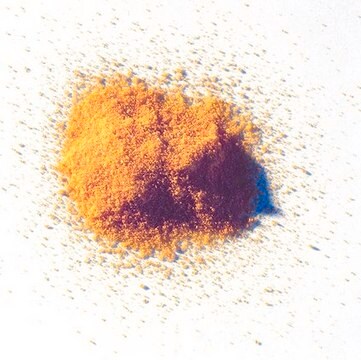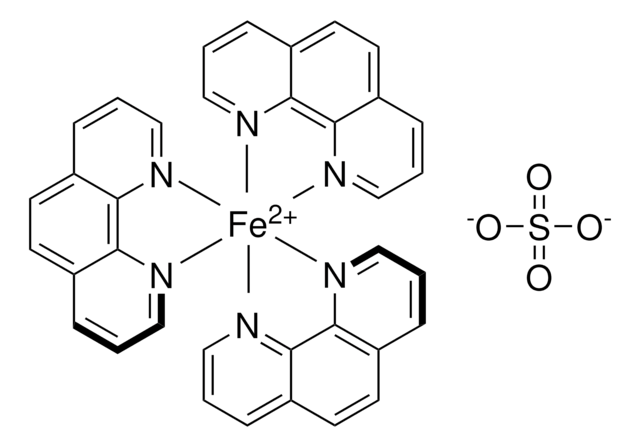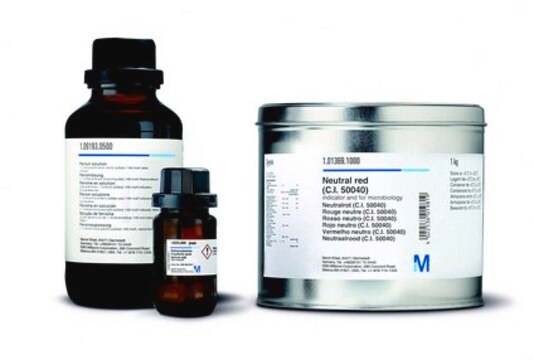1.02277
Ammonium cerium(IV) nitrate solution
c(NH₄)₂ Ce(NO₃)₆ = 0.1 mol/l (0.1 N), reag. Ph. Eur., ready-to-use volumetric solution for titration, Titriplex®
Synonym(s):
Cerium(IV) ammonium nitrate solution; Diammonium cerium(IV) nitrate solution
About This Item
Recommended Products
product name
Ammonium cerium(IV) nitrate solution, c(NH4)2 Ce(NO3)6 = 0.1 mol/l (0,1 N), Titripur®, reag. Ph. Eur.
Agency
reag. Ph. Eur.
Quality Level
product line
Titripur®
form
liquid
quality
Analyzed in our ISO 17025 accredited QC lab
reaction suitability
reaction type: Redox Reactions
concentration
0.1 M
technique(s)
titration: suitable
density
1.098 g/cm3 at 20 °C
storage temp.
15-25°C
Application
- Oxygen-evolution reaction in the presence of cerium(IV) ammonium nitrate and iron (hydr)oxide: old system, new findings.: This study explores the role of ammonium cerium(IV) nitrate in facilitating the oxygen-evolution reaction, which is crucial for various energy conversion processes (Akbari N et al., 2023).
- Reaction between Nickel Hydroxide and Cerium(IV) Ammonium Nitrate in Aqueous Solution.: Investigates the interaction between nickel hydroxide and ammonium cerium(IV) nitrate, providing insights into material synthesis and catalytic processes (Hashemi N et al., 2023).
- Facile Synthesis of Stable Cerium Dioxide Sols in Nonpolar Solvents.: Demonstrates a method for synthesizing stable cerium dioxide sols using ammonium cerium(IV) nitrate, with applications in nanotechnology and materials science (Baranchikov AE et al., 2022).
Features and Benefits
This volumetric solution is analyzed by our calibration laboratory D-K-15185-01-00 which is accredited according to DIN EN ISO/IEC 17025 for analysis of amount-of-substance concentrations in volumetric solutions by DAkkS (Deutsche Akkreditierungsstelle - German National Accreditation Body). The accreditation certificate can be found at www.sigmaaldrich.com/ISO17025.
Packaging
Analysis Note
Amount-of-substance concentration 0.0995 - 0.1005 mol/L
Measurement uncertainty ± 0.0003 mol/L
Traceability NIST SRM
The concentration is determined by volumetric titration and refers to 20°C.
The amount-of-substance concentration of this volumetric solution is traceable to a primary standard reference material (SRM) from the National Institute of Standards and Technology, Gaithersburg, USA (NIST SRM 8040 di-sodium oxalate) by means of volumetric standard Iron(II)ethylendiammonium sulfate (article number 1.02402), certified reference material according to ISO 17034, analyzed by our accredited calibration laboratory of Merck KGaA, Darmstadt, Germany according to DIN EN ISO/IEC 17025. The uncertainty is expressed as expanded measurement uncertainty with a coverage factor k=2 covering a confidence level of 95%.
Note: The titer is a correction factor to correct for variations of the volumetric solution, the titration equipment, the temperature and other laboratory conditions. For correct titration results it is recommended to determine a titer with the laboratory specific equipment and under laboratory specific conditions directly after opening a new bottle and at regular time intervals.
Legal Information
related product
Signal Word
Danger
Hazard Statements
Precautionary Statements
Hazard Classifications
Aquatic Chronic 2 - Eye Dam. 1 - Met. Corr. 1 - Ox. Liq. 2 - Skin Corr. 1B - Skin Sens. 1
Storage Class Code
5.1B - Oxidizing hazardous materials
WGK
WGK 3
Flash Point(F)
Not applicable
Flash Point(C)
Not applicable
Certificates of Analysis (COA)
Search for Certificates of Analysis (COA) by entering the products Lot/Batch Number. Lot and Batch Numbers can be found on a product’s label following the words ‘Lot’ or ‘Batch’.
Already Own This Product?
Find documentation for the products that you have recently purchased in the Document Library.
Customers Also Viewed
Articles
SmartChemicals enable wireless transfer of CoA data stored on an RFID tag on the consumable bottle to the titrator, reducing effort and chance for human error. Crucial data required for the application is transmitted safely, reliably and intelligently to the instrument.
Our team of scientists has experience in all areas of research including Life Science, Material Science, Chemical Synthesis, Chromatography, Analytical and many others.
Contact Technical Service












